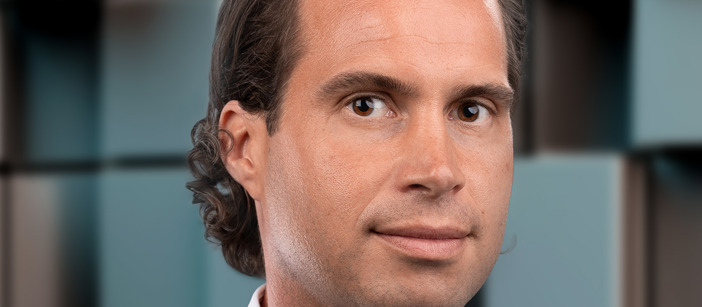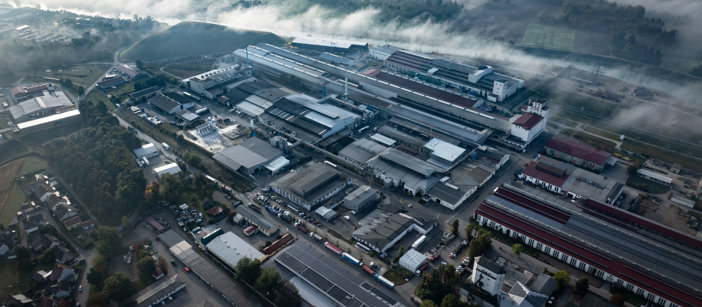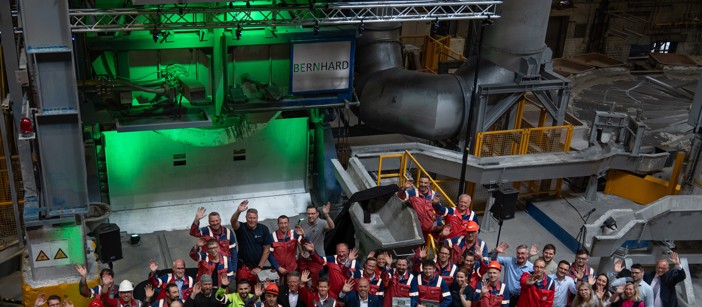
Everything on recycling

• Transformation of the Rhine plant progresses
• Expansion of storage areas for scrap cans completed
Anyone travelling east on the A 57 motorway is familiar with the four 85-metre-high chimneys of the former aluminium smelter at Neuss Rheinwerk. Daniel Rinkert knows the 300-metre-long halls, where primary aluminium was smelted using enormous amounts of energy, from his many visits. Now the SPD member of the Bundestag from Grevenbroich was back, but the electrolysis furnaces had disappeared – replaced by partition walls for huge storage boxes.
This is transformation you can touch, the very concrete change from a linear to a circular business model. “Speira has moved away from energy-intensive primary production. This decision was inevitable in light of Germany's energy policy outlook and our responsibility for the future viability of our entire company. And our transformation into a pure recycling group – a path we began over 20 years ago – has been accelerated once again,” explains Volker Backs, Managing Director of Speira.
Daniel Rinkert, Member of the German Parliament and Deputy Spokesperson for Climate and Environment in the SPD parliamentary group, believes: “Speira is demonstrating how the transformation can succeed with new economic impetus. The SPD's task is to support companies in this process. Reliability and predictability are crucial here. We will therefore continue to speed up the planning and approval processes and ensure that there are no price jumps in emissions trading that could stifle the transformation.”
40 million euros for the circular economy
Speira is investing 40 million euros in additional recycling capacity at its Rhine plant, with the aim of achieving total CO2 savings of up to 1.5 million tonnes per year. A new melting furnace exclusively for scrap was delivered in the summer and is now being installed. Production is scheduled to start in early 2026. At the same time, the third of four existing casting plants is being converted and optimised for recycled alloys. In this way, the Rheinwerk is further reducing its ecological footprint.
The new scrap storage facility is already complete, because the furnaces – and with them Speira's ambition to develop the Rhine plant into Europe's leading recycling hub – need to be ‘fed’. The new storage areas cover a third of the decommissioned smelter and will be supplemented by facilities for sampling incoming scrap. ‘The long halls allowed us to think and plan big. This huge new scrap storage facility creates space for more input for all our recycling furnaces – not just the new one,’ says Boris Kurth, head of the beverage can business at Speira and head of the Rheinwerk. ‘We need the sampling for scrap that has already gone through one life cycle. These “post-consumer scraps” are a source that we want to utilise much more.’
Everything for the fast-moving recycling good
The new recycling furnace will then melt aluminium alloys that are processed into beverage cans after rolling. Speira can demonstrate its own sustainability ambitions particularly well in this market. This is because beverage cans are a very fast-moving product, with a life cycle from production to filling, retail sale, consumption by the end user, disposal and recycling lasting only around 60 days. This means that the same aluminium cans pass through Speira's recycling facilities many times a year, allowing the ecological advantages of state-of-the-art technology to be exploited particularly frequently and efficiently. That is why Speira is also committed to continuously improving the recycling rate for beverage cans: under the umbrella of the European Aluminium association, the company is working with other manufacturers to research recycling-friendly alloys and promote deposit, return and collection systems for this valuable light metal.




